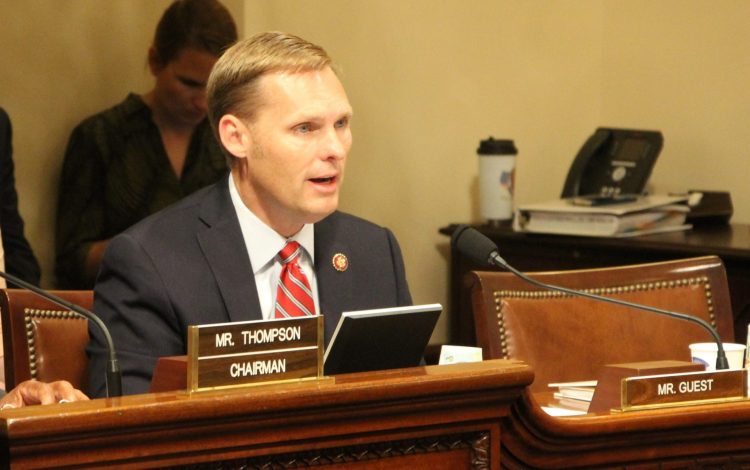
Bills move past last major committee deadline for 2022 session.
The Mississippi Legislature faced a major committee deadline on Tuesday as it was the final day on the calendar for many general bills and constitutional amendments.
By the end of the deadline day, the House had killed 60 Senate bills and the Senate killed 88 of the House’s bills.
DEAD BILLS:
Senate Teacher Pay Raise
Probably the most talked about bills to die on Tuesday were the Senate teacher pay raise bills. SB 2444 and SB 2443. The primary of the two, SB 2444 which gave an increase to teachers and assistant teachers, was referred to Education and Appropriations but was not taken up in either.
Once adjourning for the day, this action by the House forced the Senate to either abandon any pay raise or adopt the House bill. The Senate gaveled back in at 4:00 on Tuesday and called additional Education and Appropriations meetings in order to move the House pay version, HB 530, through the process.
The original bills had minor differences but would bring teachers to the minimum salary of the Southeastern average. When the Senate moved HB 530 through committee, they adopted a strike all and inserted the language from SB 2444.
That language means teachers at years 5, 10, 15, and 20, teachers would receive a larger increase based on their certification. Class A teachers (baccalaureate) would receive $1,325; Class AA teachers (master’s degree) would receive $1,425; Class AAA (specialist) would receive $1,525; and Class AAAA (doctoral) would receive $1,625. At 25 years of service, teachers would receive an increase of $2,500.
Assistant teachers will already receive a raise of $2,000.
The chamber also chose to take the bill up on the floor on Wednesday, passing it unanimously by voice vote. It has been returned to the House for concurrence.
State park funding from Mississippi Lottery
HB 449 would have diverted net proceeds from the Mississippi Lottery Corporation to the Mississippi Park Fund. The fund would be made up of the sales of lottery tickets, up to ten percent monthly, and deposited into a corporate operating account. While the bill did die on the calendar, several other state park related bills from both chambers survived.
Buddy’s Law
One bill that had animal advocated frustrated with the House Judiciary B decision was Buddy’s Law, SB 2261. This bill would have required psychiatric evaluations on children who abuse animals. The bill was authored by Senator Angela Hill after the brutal burning of a dog named Buddy in North Mississippi by a teenager last spring.
Hill said youth court judges across the state had seen an uptick in these types of cases and while a child cannot be charged with the abuse, they could get help. Animal abuse is linked to mental health issues later in life..
The bill passed through the Senate after an outpouring of support from the community. However, chairman Nick Bain of Judiciary B in the House chose not to take the bill up prior to the Tuesday deadline.
RELATED: Children who abuse animals could be subject to psychiatric evaluations
“Killing Buddy’s Law fails to protect Mississippians from crime. It is a slap in the face for everyone who followed the recovery of Buddy, the precious dog scorched by a minor who faces no consequence, nor could be mandated to receive mental health care,” said Doll Stanley, In Defense of Animals’ Justice for Animals Campaign Director who was part of the group to present the legislation to Hill. “It’s absolutely shocking that the men and women we vote in to represent us choose to serve their personal whims. No rational person could oppose mental health care for minors whose propensity for violence and cruelty is a red flag for escalating violence.”
ALIVE BILLS:
House Teacher Pay Raise Bill
While the Senate pay raise bills died, HB 530 remained intact but massively changed by the strike all overriding the bill with Senate pay raise language. However, because of its passage a vehicle still remains for Mississippi teachers to receive a pay increase in the next fiscal year.
Initiative Process
Among the bills that survived is HCR 39, the constitutional amendment to rectify the initiative process for Mississippi voters. The legislation, proposed by the House, would allow for Mississippians to submit ballot initiatives once again. However, the previous law allowed for those initiatives to make changes to the state’s constitution. The new amendment would not allow for those changes.
The way in which an initiative is submitted is similar as before and based on a percentage of signatures from each congressional district at the time of creation in order for it to be included in the nearest general election ballot.
Covid-19 Mandate Prohibition
This year, several bills were introduced in both chambers to prevent further vaccine mandates in the workplace and schools in the state of Mississippi.
RELATED: Mississippi House attempts to stop state, local government COVID vaccine mandates
HB 1509, which was authored by Speaker Philip Gunn, remains alive and would prohibit any state or local government from imposing a COVID-19 vaccine mandate among public employers and schools including colleges and universities. The bill also allows for religious liberty exemptions where they apply.
The bill was passed in committee prior to the deadline day.
Postpartum Coverage
Unlike in last year’s Medicaid Technical Amendments bill, an extension of postpartum coverage up to 12 months for mothers on Medicaid remains alive after moving out of the House Medicaid committee.
RELATED: Mississippi Senate moves prenatal postpartum care bill forward
The bill, SB 2033, was championed by Senator Kevin Blackwell who said mothers and babies in the state would benefit from an increase in medical care. The postpartum coverage was extended by the federal government during the COVID-19 pandemic, this legislation will leave that stipulation in place. Twenty other states have already extended the coverage on their own.
Mississippi has the highest infant mortality rate with roughly 9 deaths per 1,000 births. Many behind the bill believe this will help lower that number and work towards the goal of making Mississippi the “safest place for an unborn baby,” as coined by former Governor Phil Bryant.
State Park Facelift
Mississippi’s state parks could still stand to benefit from additional funding for maintenance and upgrades this year. Both the House and Senate plans to revamp parks are alive.
Senate bill 2495 would create the Senate’s version of the Mississippi Outdoor Stewardship Trust Fund. Not to be confused with last year’s House bill with the same name, this legislation would provide additional funding to state parks but through an appropriation by the legislature.
RELATED: A facelift could be ahead for Mississippi state parks
Last year’s House bill, and this year’s bill HB 606, which is named the same thing, recommends a similar fund but it is funded by a diversion of sales tax from wildlife gaming purchases. The fund would not exceed $20 million over a three year period.
Monies under each chamber’s plan would go toward improvement of state parks, city and county trails, restoration or enhancement projects to improve access to public water or lands, and the protection of clean water, wildlife, hunting, fishing, military installation buffering or natural resource-based recreation.
Critical Race Theory
One of the most controversial bills of the session is SB 2113 which would prohibit the generally accepted ideals of CRT from being taught in any public schools, including charter schools and universities.
RELATED: Mississippi Legislature takes on Critical Race Theory in public schools
The bill was authored by Senator Mike McLendon and specifies the teaching that “any sex, race, ethnicity, religion or national origin is inherently superior or inferior or that individuals should be adversely treated on the basis of their sex, race, ethnicity religion or national origin.”
The bill was passed in the House committee and read for the third time.
The remaining general bills and constitutional amendments face a tight floor deadline of next Wednesday, March 9.











